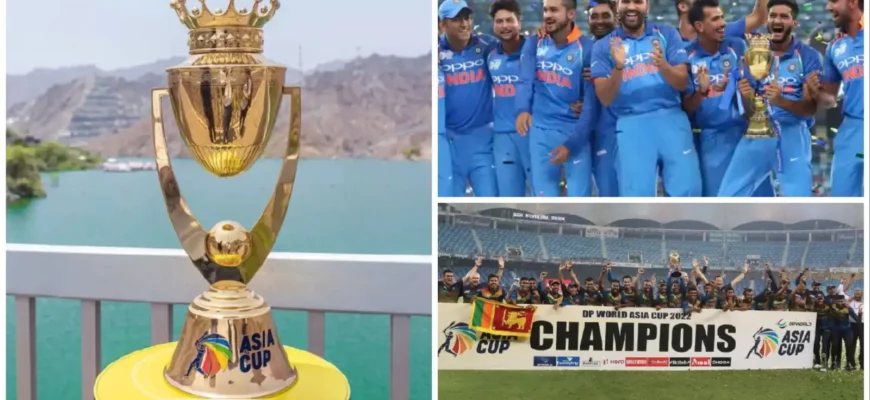The Dubai International Stadium, a crucible of cricketing dreams and high-stakes drama, recently bore witness to an Asia Cup 2025 final that will undoubtedly be etched into the annals of sports history. Not merely for the electrifying contest between arch-rivals India and Pakistan, nor for India`s ninth Asia Cup crown, but for a post-match spectacle that redefined the very essence of victory: a celebration held without its most coveted symbol, the trophy itself.
The Thriller on the Pitch: A Game of Two Halves
The final was a nail-biter. Pakistan, batting first, initially looked set for a commanding total, cruising at 113/1 in the 13th over. The atmosphere was tense, the stakes immense. Then, as if a switch had been flicked, India`s spin attack orchestrated a collapse of epic proportions. Led by the mesmerizing Kuldeep Yadav, who claimed four crucial wickets including a game-changing triple strike in the 17th over, Pakistan crumbled, losing nine wickets for a mere 33 runs and being dismissed for 146 in 19.1 overs. Jasprit Bumrah, Axar Patel, and Varun Chakaravarthy each chipped in with two wickets, dismantling their formidable opponents.
India`s chase, however, was no less dramatic. Stumbling early at 20/3, the pressure mounted. Yet, under the searing Dubai lights, young Tilak Varma emerged as a beacon of resilience, crafting an unbeaten 69 off 51 balls. His partnerships with Sanju Samson and Shivam Dube steadied the ship, setting the stage for Rinku Singh to apply the finishing flourish. A boundary clinched a five-wicket victory with a ball to spare, igniting fervent celebrations among the Indian contingent. The match itself was a testament to competitive spirit and cricketing prowess.
The Unseen Trophy: A Political Statement in a Sporting Arena
What followed, however, transcended the boundaries of sport and plunged directly into the realm of geopolitics. As the euphoria of victory settled, a palpable tension descended upon the stadium. The Indian players, led by captain Suryakumar Yadav, made an unprecedented decision: they refused to accept the Asia Cup trophy from Mohsin Naqvi, the Asian Cricket Council (ACC) chief who also happens to be the chairman of the Pakistan Cricket Board (PCB).
This refusal wasn`t a spontaneous act of pique but the culmination of simmering tensions that had permeated the entire tournament. Earlier in the event, a traditional pre-final photoshoot with the trophy had been cancelled after Suryakumar Yadav declined to pose alongside Pakistan skipper Salman Ali Agha and Naqvi. The tournament itself, held months after a significant terror attack, had already seen India`s refusal to engage in the customary handshakes with Pakistani players during earlier group and Super Fours encounters. The final, the first-ever India-Pakistan summit clash in Asia Cup history, only amplified these underlying frictions.
The result? A presentation ceremony left in limbo, Pakistani players delaying their appearance, and the victorious Indian team celebrating an extraordinary triumph, paradoxically, empty-handed. Suryakumar Yadav was notably seen performing a celebratory run, mimicking the gesture of holding a trophy that was conspicuously absent.
Beyond the Boundary: When Sport Meets Statecraft
This incident serves as a stark reminder that in the volatile landscape of India-Pakistan relations, even the purest form of sporting competition can become a canvas for broader political narratives. The refusal to accept a trophy from an official representing a rival nation, regardless of their ACC role, was a powerful, silent protest, a message sent without a single word uttered into a microphone.
While some might lament the intrusion of politics into sport, others view it as an unavoidable consequence when nations with complex histories meet on such a high-profile stage. The irony, of course, is undeniable: a team achieves the pinnacle of success, overcoming tremendous odds, only to find the tangible symbol of that achievement caught in a diplomatic crossfire. It leaves one pondering the true cost of victory when it comes without its traditional adornment, relying instead on the unshakeable pride and unity of a team.
The Asia Cup 2025 final will be remembered not just for the breathtaking cricket, but for the dramatic tableau it presented: a triumphant team, basking in glory, yet choosing to make a statement louder than any roar of the crowd, by simply walking away from the silver sheen of the trophy.







